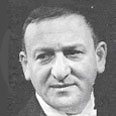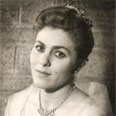Born in the Polish town of Chechnov, in 1923, Shoshana Ravid was brought up in the German town of Danzig, (now Gdansk, Poland) – the only daughter among 4 sons born to the Jewish philosophy scholar, Dr. David Schmuckler, and his wife, Sara. Already at an early age, she joined HABONIM, a Zionist youth movement which promoted the ideals of the Labor Movement of the Jewish community in Mandatory Palestine.
In 1939, still in her teens, she boarded a steamship headed for Mandatory Palestine. Arriving by herself, she settled in the northern part of the country, in Kibbutz Kfar Giladi. She was immediately swept into the drama groups of both her kibbutz, as well as Kibbutz Givat HaSh’losha, and was “bitten” by the acting bug. She was soon noticed by Menachem G’nessn, an actor and director, who was one of the three founders of HABIMA – the first Hebrew-speaking theater in Eretz Israel.
That fortuitous meeting with Gnessin, paved the road for Shoshana’s acceptance into HABIMA’s drama school – a most coveted acting school of its time, which was directed by Gnessin himself.
Fully committed to the theater life, Shoshana would travel daily by bus the 4-5 hours it would take to arrive from Kfar Giladi to Habima’s school, in Tel-Aviv, and back.
In Habima, Shoshana not only found her vocation in life, but also the man of her life: Shraga Friedman, a young, aspiring actor who, like herself managed to escape the war in Europe, was her classmate at the drama school, and soon became her husband. From then on, Tel-Aviv would become her permanent home.
Inspired by its Russian birthplace, the founders of HABIMA and its actors operated within a Collective structure, where the group members saw themselves working jointly with a single goal, which was larger than themselves.
Admission into that Collective was only granted by a nod of approval by the older, established members - an approval granted to Shoshana after she completed her first year at the school: indeed, she then joined the theater as an acting-trainee. Not long after, in 1956, upon graduating, she was accepted by the repertory theater as a fully-fledged member of its ensemble.
During the 1948 War of Independence, as a member of a number of military entertainment troupes which were formed under the artistic direction of her husband, Shraga, Shoshana, with her HABIMA classmates, visited some of the remotest warzones to entertain the combat soldiers. Their first program – “WITHOUT A DOUBT” - premiered on May 7th, a mere week prior to the proclamation of the new state, which featured the song “Dudu” - a popular song of the era.
As one of HABIMA’s younger generation’s stars, Shoshana appeared in a variety of leading roles, in classical as well as contemporary plays by Shakepeare, Aristophanes, Chekhov, Maeterlink, Gordin and others, including, Desdemona, in OTHELLO, the main fairy, in MID SUMMER’S NIGHT DREAM, Cordelia, in KING LEAR, and Portia, in THE MERCHANT OF VENICE; Lysistrata, in LYSISTRATA; Catherene, in A VIEW FROM THE BRIDGE; Yelena Andreyevna, in UNCLE VANYA; Tyltyl, in THE BLUE BIRD; Sheindle, in MIRELE EFROS – in all of which her natural talent, clear voice and enunciation, as well as her erstwhile admiration for the writers and directors of the classically-constructed plays, won the appreciation of both the viewers in the theater, as well as the reviewers in the media.
Shoshana also lent her talent to scores of radio dramas, of which many were based on original stage plays and/or literary works, including MIRELE EFROSS, by Jacob Gordin; THE FLIES, by Jean Paul Sartre; THE SEAGULL, by Anton Chekhov, and THE 56 KILOMETER, by Moshe Shamir, to name but a few.
Shoshana was also a sought-after film actress. In the 1953 film YEHONATAN AND TALLI, she portrayed a Holocaust survivor who’s looking for the two kids she had lost in the war – a role for which she received raving reviews. ELDORADO, PRISONERS OF FREEDOM, ENTEBBE were among the other films she acted in.
In the 1960’s, at the top of her acting career, Shoshana, then a mother of 2 young children, opted to retire and devote time to her family.
It was only when the kids were older that she got back to the stage – this time as an independent actress. In Bammah 73, she 'was Hedda, in HEDDA GABLER (Henryk Ibsen). In Moshe Halevi Theater, she co-starred with Alexander Yahalomi, in LA RONDE, by Arthur Schnitzler; In Yovel Theater, she was the director of RED SHOES; In the Sh’dera Theater she acted in THE TRIAL of MARY DUGAN, by Bayard Veiller; in the Cameri she played BAT SHEVA, in King Solomon and Shalmai the Cobbler. She also volunteered her time as director of the drama group at the Tel Mund jail, where she produced with the inmates the play Anna Frank, and directed an amateur drama group in Kfar Shmaryahu.
In 1970 she took part in the pageant IF I FORGET THEE, about Jerusalem, alongside HABIMA’s legendary actress, Hannah Rovinna, Gideon Shemer and Hayim Yavin, which was put together and directed by her husband Shraga Friedman, who passed away prior to the pageant’s opening night.
In the early 1980’s, Shoshana founded and managed YANSHOOF Theater, of which the first play was Stephen Poliakove’s STRAWBERRY FIELDS. One of its young actors was Yoram Levinshtein, who now heads his own drama school, bearing his name.
In 1986, Shoshana was asked to play Mrs. Higgins, in an independent production of “My Fair Lady”. It was the very musical her late husband Shraga co-translated into Hebrew together with Dan Almagor, a few years earlier.
Shoshana passed away on March 6, 2012, leaving behind her two sons, Danny and Amos, her daughter, Yael and 7 grandchildren.
As part of the City of Tel-Aviv’s ongoing program of commemorating the city’s creative citizens, a memorial plaque with her name was installed on the house she lived in, at 75 Einstein Street, in Ramat Aviv, next to the plaque of her husband Shraga, who preceded her in death.
Well-versed in the German language of the town she was brought up in, Shoshana used to often quote from Heinrich Heine’s poetry – most notably the poem about The Lorelei…Perhaps because the golden-haired, clear-voiced Shoshana saw herself reflected in that image…
The fairest of maidens is sitting
So marvelous up there,
Her golden jewels are shining,
She's combing her golden hair.
She combs with a comb also golden,
And sings a song as well
Whose melody binds a wondrous
And overpowering spell.
(Mirra Painter, Los Angeles)




